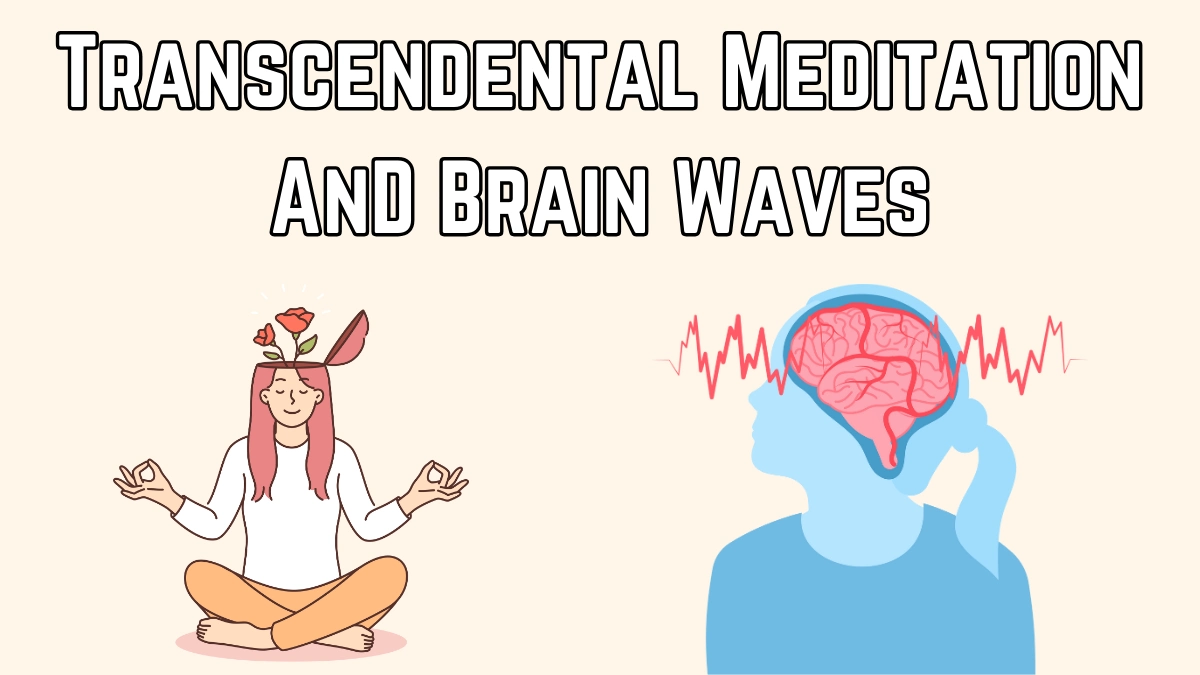Table of Contents
- Brain waves
- Transcendental Meditation
- Meditation techniques and their impact on the brain
- Scientific Research on Transcendental Meditation
- Impact on Health and Well-being
- Final Verdict
- FAQs on Transcendental Meditation and Brain Waves
- How does transcendental meditation affect brain wave patterns observed in electroencephalography (EEG)?
- Can practicing transcendental meditation influence both hemispheres of the brain?
- What changes occur in the frontal areas of the brain with regular transcendental meditation?
- Does transcendental meditation impact the neural oscillations in specific regions of the brain?
Do you ever wonder why some people seem to navigate life’s stresses with ease while others are easily overwhelmed? The secret may lie in the subtle dance of brain waves.
Transcendental Meditation, a practice with ancient roots, has made its way into modern consciousness as a powerful ally for mental health. In this article, we will explain the relationship between transcendental meditation and brain waves and how does it positively influence your brain’s electrical patterns.
You’ll discover the different types of brain waves, how they contribute to your emotional and cognitive experiences, and the role TM plays in harmonizing them.
Brain waves
Brain waves are the rhythmic electrical impulses generated by the activity of neurons in the brain, and they play a pivotal role in determining our state of mind and consciousness. Brain waves are a crucial aspect of understanding how practices like transcendental meditation impact the mental state.
They are measured in frequencies, and each type of wave corresponds to different states of consciousness.
5 Types Of Brain Waves
| Explanation | When They Activate | Frequency | |
| Delta | Delta waves are the slowest brain waves and are associated with deep, dreamless sleep or profound states of meditation | Activated during deep sleep and restorative healing | 0.5–4 Hz |
| Theta | Theta waves are linked to creativity, intuition, daydreaming, and deep relaxation. | Common during light sleep, deep meditation, and REM | 4–8 Hz |
| Alpha | Alpha waves are associated with a state of wakeful relaxation and a calm, focused mind. | Present during quiet, thoughtful, and meditative states | 8–12 Hz |
| Beta | Beta waves are connected to active, analytical thought and the engaged, alert mind. | Occur during waking activities, problem-solving, and focused mental activity | 12–30 Hz |
| Gamma | Gamma waves are the fastest and are tied to heightened perception and consciousness. | Arise during intense concentration, high-level information processing, and cognitive functioning | 30–100 Hz |
During transcendental meditation, practitioners often experience a shift in their brain wave patterns, typically moving from the high-frequency beta waves associated with day-to-day alertness to the slower alpha and theta waves indicative of deep relaxation and heightened creativity.
This shift not only promotes a profound sense of peace but also facilitates a connection with the subconscious mind. By exploring the science behind brain waves, we can begin to appreciate the profound impact that transcendental meditation can have on our overall well-being, offering a respite from the constant noise of modern life and allowing us to access a more centered and mindful state of being.
Read our article on Transcendental meditation and hormonal health to get more insightful details.
Brain Wave Coherence
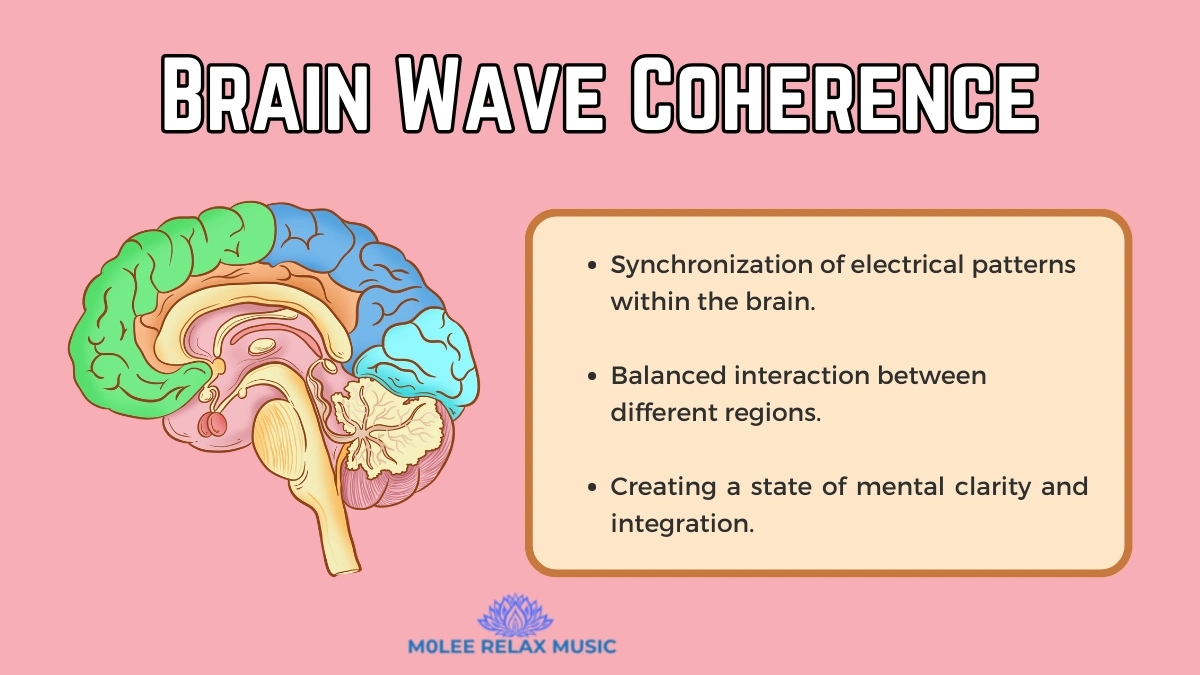
Brain wave coherence refers to the synchronization of electrical patterns within the brain, signifying a harmonious and balanced interaction between different regions. When brain waves are coherent, they oscillate in unison, creating a state of mental clarity and integration that enhances cognitive functioning and overall mental health. This coherence is often associated with increased creativity, improved problem-solving abilities, and a greater sense of calm.
During activities such as focused attention, meditation, and deep contemplation, the brain tends to exhibit higher levels of coherence. Transcendental Meditation technique, in particular, has been shown to increase coherence across various brain regions, suggesting a more orderly and efficient functioning of the brain. This elevated coherence can lead to a more unified sense of self, often described by practitioners as a state of heightened awareness or transcendence.
Moreover, consistent practice of techniques that promote brain wave coherence can have long-term benefits. Studies suggest that individuals who regularly engage in practices that enhance coherence may experience reduced anxiety, better emotional stability, and improved resilience to stress.
By fostering a state of coherence, one can tap into the brain’s innate potential for self-regulation and optimal performance, making it a crucial aspect of mental well-being and development.
Brain Plasticity
The concept of brain plasticity has revolutionized our understanding of the brain’s capabilities, revealing that our neural pathways are not fixed but can be altered and strengthened over time. Meditation practices are thought to promote plasticity by enhancing the connections between neurons, which can affect the brain in various positive ways.
Can you rewire your brain with meditation?
Yes, meditation can indeed rewire your brain. Practices like transcendental meditation promote changes in brain structure and function, which is a manifestation of neuroplasticity. Through regular meditation, individuals can strengthen neural connections and even create new pathways, leading to improved cognitive abilities and emotional well-being.
Does meditation increase neurons in the brain?
Meditation doesn’t necessarily increase the number of neurons, but it can lead to changes in the brain’s gray matter. Studies have shown that consistent meditation can result in increased gray matter density in areas related to memory, self-awareness, and empathy. The growth of dendritic branches and synapses between neurons also enhances neural communication.
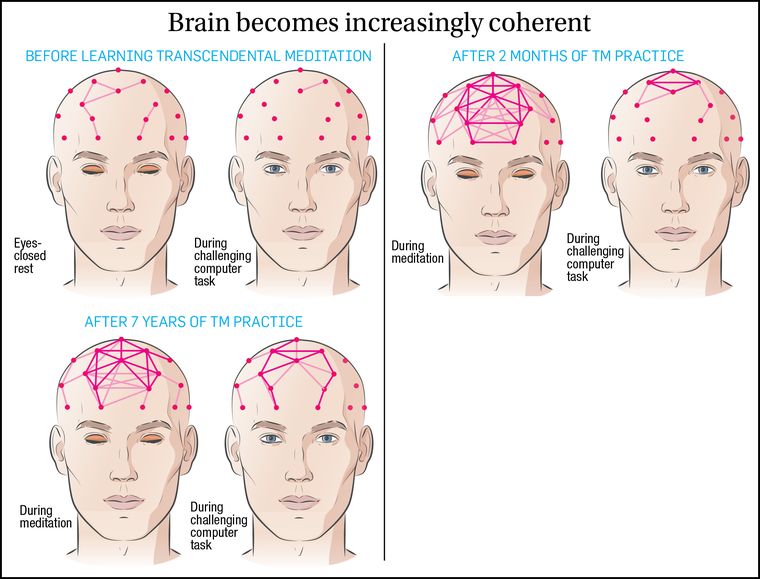
What is the neurochemistry of meditation?
Meditation can influence the neurochemistry of the brain by altering the levels of various neurotransmitters. It has been associated with increased levels of serotonin and GABA, which promote relaxation and mood stabilization. Meditation can also decrease cortisol, the stress hormone, and increase the production of endorphins, the body’s natural painkillers and mood elevators.
Is the impact of meditation on brain plasticity observable and measurable?
Yes, the impact of meditation on brain plasticity is both observable and measurable. Neuroimaging techniques, such as MRI, have revealed structural changes in the brains of mediators, including areas related to attention, self-awareness, and emotional regulation. Additionally, EEG recordings show altered brain wave patterns, indicating functional changes due to meditation practice.
Can meditation help recover from brain injuries?
While meditation is not a cure for brain injuries, it can be a valuable tool in the rehabilitation process. By harnessing the principles of neuroplasticity, meditation can help rebuild.
Transcendental Meditation
Transcendental Meditation is a form of silent mantra meditation developed by Maharishi Mahesh Yogi. This technique requires individuals to sit comfortably with their eyes closed and silently repeat a specific mantra for approximately 20 minutes, twice a day. The mantra, often Sanskrit in origin, serves as a focal point to help facilitate a state of relaxed awareness.
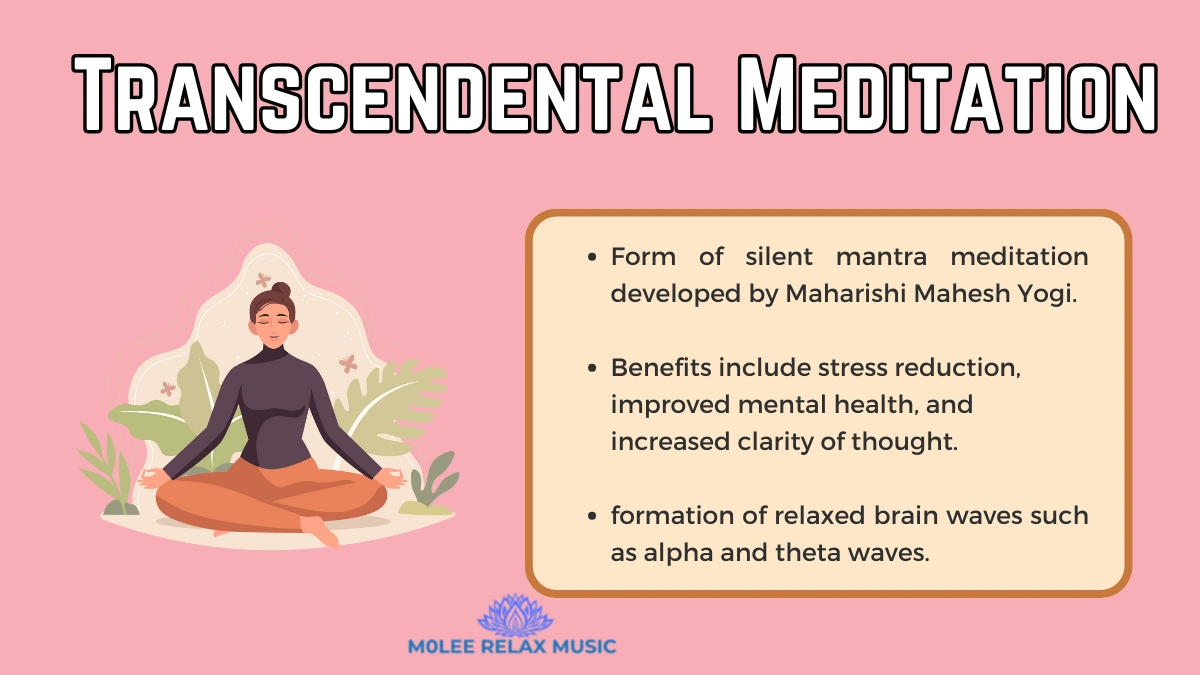
TM’s popularity stems from its promised benefits, which include stress reduction, improved mental health, and increased clarity of thought. Students of TM report a unique cognitive state during practice, characterized by restful alertness, which may contribute to the various positive outcomes associated with this practice.
Research suggests that TM can change brain functioning in several ways. For instance, it has been linked to the formation of relaxed brain waves such as alpha and theta waves. These brain waves suggest a state of calmness and are associated with heightened creativity and stress relief.
TM is a secular practice and can be learned from a certified instructor. The initial learning process requires a short period of instruction followed by regular self-practice. Despite its origins in Eastern philosophy, it’s commonly practiced worldwide by individuals of diverse backgrounds.
Meditation techniques and their impact on the brain
Transcendental meditation and other techniques significantly influence brain activity, reshaping mental performance and overall well-being.
| Meditation Technique | Description | Impact on Brain Structure | Impact on Brain Function | Notable Benefits |
|---|---|---|---|---|
| Transcendental Meditation (TM) | Silent repetition of a mantra to transcend the thinking process. | Increases cortical thickness, especially in areas related to sensory, auditory, and visual perception. | Enhances coherence across different brain regions, promoting overall brain connectivity and efficiency. | Reduces stress and anxiety, improves emotional well-being, and enhances self-awareness. |
| Mindfulness Meditation | Involves paying attention to the present moment with an attitude of openness and non-judgment. | Can increase gray matter density in the hippocampus, known for its role in learning and memory, and in areas associated with self-awareness and introspection. | Boosts focus and concentration and reduces activity in the default mode network, which is active during mind-wandering and self-referential thoughts. | Enhances attention, reduces symptoms of anxiety and depression, and improves overall psychological well-being. |
| Loving-Kindness Meditation (LKM) | Focuses on developing feelings of goodwill, kindness, and warmth towards others. | This may lead to increased gray matter volume in the brain regions associated with empathy and emotional regulation. | Encourages positive emotional states and strengthens the ability to empathize with others, reduces bias against others. | Increases positive emotions, decreases negative emotions, and enhances feelings of social contentedness. |
| Vipassana Meditation | A traditional Buddhist practice focusing on deep, concentrated awareness of the present moment and the impermanent nature of sensory experiences. | Associated with changes in areas of the brain related to body awareness, self-control, and the regulation of emotional responses. | Improves introspective accuracy and mindfulness, and reduces reactivity to negative emotional stimuli. | Promotes emotional balance, increased self-awareness, and a deeper understanding of the mind-body connection. |
| Zen Meditation (Zazen) | Involves sitting in a specific posture and focusing on breathing while observing the thoughts and sensations that arise without attachment. | May increase the thickness of the prefrontal cortex and protect against age-related decline. | Enhances the state of alertness and presence, and decreases the frequency of intrusive thoughts. | Improves cognitive function, reduces stress, and fosters a greater sense of peace and mental clarity. |
Effects Of Meditation On Brain Waves
The practice of meditation can alter an individual’s brain waves, nurturing a state of relaxation. Certain techniques, including transcendental meditation, have been shown to change brain wave patterns, enhancing alpha and theta waves which are associated with a state of calm wakefulness and creative thinking.
How does meditation affect the brain’s aging process?
Research suggests that meditation can slow down the brain’s aging process by preserving the brain’s gray matter and improving the thickness of the prefrontal cortex. These effects can enhance cognitive function and decrease the decline in mental faculties associated with aging.
Improving mental performance
Regular engagement in meditation practices is linked to improved cognitive functions. Studies illustrate that meditation sessions can lead to marked changes in the brain’s structure and connectivity, which correlates with enhanced focus, memory, and decision-making abilities.
Benefits Of Meditation On The Brain
- Enhanced Concentration and Attention: Meditation improves the brain’s ability to focus, reducing the tendency to become distracted and enhancing the capacity to perform tasks without losing concentration.
- Stress Reduction: Regular meditation practice has been shown to decrease the production of stress hormones, such as cortisol, leading to a more relaxed and less anxious state of mind.
- Better Emotional Regulation: Meditation helps in managing emotions more effectively, leading to fewer extreme reactions to negative situations and a more balanced emotional state.
- Increased Gray Matter Density: Certain types of meditation can lead to an increase in gray matter density in areas of the brain involved in memory, learning, and self-awareness.
- Reduced Age-Related Brain Atrophy: Some studies suggest that meditation can help maintain brain volume and reduce the thinning of the cerebral cortex that occurs with age.
- Improved Memory: By boosting the connectivity of brain cells, meditation can enhance memory retention and recall abilities.
- Greater Creativity: Meditation can foster an environment for the brain where creativity is nurtured, allowing for more innovative and original thought processes.
Scientific Research on Transcendental Meditation
Substantial scientific research has been conducted to establish a relationship between Transcendental Meditation and changes in brain wave patterns.
EEG Studies and Findings
Scientists have utilized electroencephalograms (EEGs) to monitor brain activity during Transcendental Meditation. They have observed increased alpha waves, which are often associated with deep relaxation.
Furthermore, these studies have revealed a state of restful alertness indicated by coherent front parietal connections. A specific investigation highlights the effects on brain functioning and stress reactivity among college students practicing Transcendental Meditation.
Long-Term Effects on Brain Function
Long-term practitioners of Transcendental Meditation demonstrate enhanced neural plasticity and cognitive resilience. Research suggests the practice can positively affect the thickness of certain brain regions related to emotions and self-regulation, thereby potentially providing long-term benefits to mental health. An in-depth analysis can be found in the review exploring how Transcendental Meditation alters the brain.
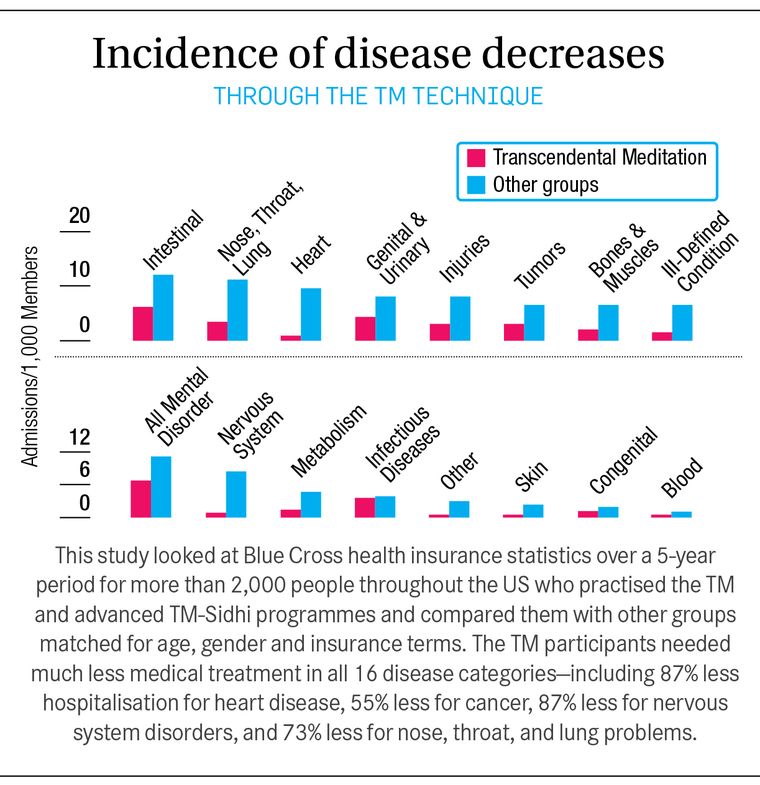
Comparative Studies With Other Forms of Meditation
When comparing Transcendental Meditation to other forms, researchers note distinct physiological differences. While various meditation techniques impact the brain differently, Transcendental Meditation is unique in its use of mantras. It has been reported to induce deeper states of rest than other forms, as supported by a systematic review of transcendent states across various meditation practices.
Impact on Health and Well-being
TM is notable for its potential to improve health and well-being through stress reduction, mental health influence, and physical health effects.
Stress Reduction and Relaxation
Regular practice of TM has been linked with reduced stress and increased relaxation. It encourages a state of restful alertness, which can lower cortisol levels, commonly known as the stress hormone. Studies highlight that even a few months of practicing TM can lead to noticeable stress relief, as the technique modifies the brain’s response to stress.
Influence on Mental Health
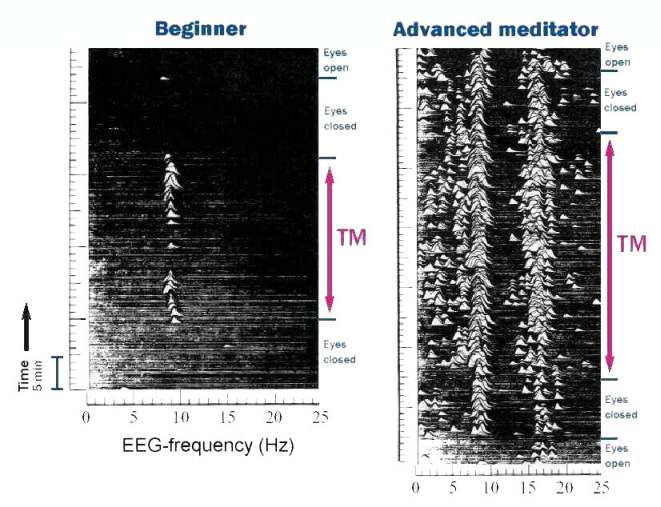
TM’s impact on mental health is significant and it can alter brain activity in a way that promotes emotional well-being. Meditation can induce relaxation-related brain waves, like alpha and theta waves, which are associated with a calm and wakeful state.
Research suggests those who engage in TM may experience reductions in symptoms of anxiety and depression, implying a beneficial shift in overall mental health.
Effects on Physical Health
In addition to mental health benefits, TM may have positive effects on physical health. The relaxation response triggered by TM practice contributes to cardiovascular health, evidenced by lowered blood pressure and reduced risk of heart disease.
Furthermore, a randomized clinical trial suggested that TM practice could lessen psychological distress among healthcare workers, although the reduction was not significantly different from a control group.
Read our full article on Transcendental meditation and brain function
Final Verdict
To wrap things up, transcendental meditation has a powerful effect on the brain. It changes our brain waves in a good way, helping us feel more relaxed and alert. Studies have shown that when we do transcendental meditation, our brain works better and we can feel calmer.
So, if you’re looking to improve your mind and find some peace, transcendental meditation could be a great thing to try. It’s all about making our brain waves work for us to help us feel and think better.
FAQs on Transcendental Meditation and Brain Waves
How does transcendental meditation affect brain wave patterns observed in electroencephalography (EEG)?
EEG studies show that during transcendental meditation, there’s an increase in alpha brain waves, indicating a state of deep relaxation. This shift in neural oscillations is a sign of the brain entering a more restful and alert state.
Can practicing transcendental meditation influence both hemispheres of the brain?
Yes, transcendental meditation promotes balanced activity between both hemispheres of the brain, leading to improved communication and coordination across various regions of the brain.
What changes occur in the frontal areas of the brain with regular transcendental meditation?
Regular transcendental meditation can lead to increased blood flow and enhanced functioning in the frontal areas of the brain, which are associated with attention, planning, and decision-making.
Does transcendental meditation impact the neural oscillations in specific regions of the brain?
Transcendental meditation can normalize neural oscillations across different regions of the brain, fostering a more synchronized and efficient brainwave pattern that enhances cognitive function and emotional stability.


